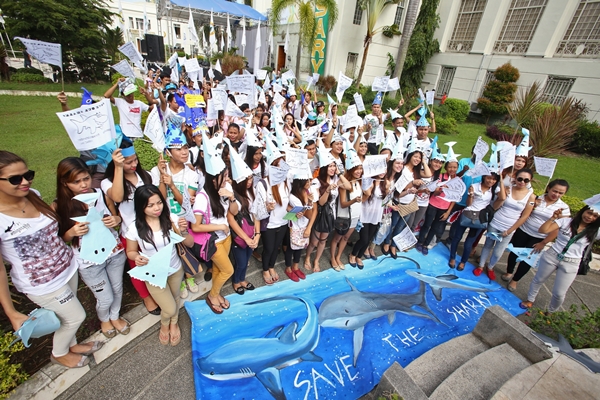
Hundreds of students from the University of the Visayas (UV), University of Cebu (UC), and University of San Jose-Recoletos (USJ-R) wear shark shape cartoon made hats, wave around small flags and display a large tarpaulin with a drawing of a shark as they join members of Greenpeace at the Capitol. (CDN PHOTO/JUNJIE MENDOZA)
Cebu province may be the first to set up a “shark sanctuary” in the waters off Daanbantayan town if provincial legislators build on the momentum of the first Shark Summit which ended yesterday.
The idea was discussed on the sidelines of the national gathering of ocean defenders in Cebu City.
Gary Cases, who operates the dive shop Divelink in Malapascua Island, told Cebu Daily News he’s pitching the idea to local conservationists and Capitol officials because thresher sharks and rays which frequent Malapascua Island are “more valuable alive” for tourism than as meat for fishballs.
Meanwhile, Provincial Board Member Thadeo Ouano said his staff would study how to widen the scope of a 2012 ordinance to make the Provincial Fisheries and Aquatic Ordinance “a more effective basis for apprehension.”
The ordinance specifies only one instead of three species of thresher sharks (Alopias Vulpinus) for protection, a loophole that needs to be closed.
“After the summit, I realized that there is still a lot that we can do to improve the ordinance. It mostly concerns technical and scientific aspects where we can use the help of shark experts,” he told CDN.
Greenpeace oceans campaigner Vince Cinches said the list is insufficient since it omits other species found in the shark family.
Based on national data, the Visayan Sea is the second largest producer of sharks and rays where about 20 species are reportedly traded or transshipped in Cebu province.
Cebu is the only province with an ordinance that protects thresher sharks, whale sharks locally called “butanding” or “tuki”, giant manta rays (“sanga”) and sun fish (“Mola Mola”) as vulnerable species of fish.
Under the 2012 ordinance, it is illegal to “hunt, catch, possess, transport, sell, buy, distribute, wound or kill” these marine animals.
Ouano, who chairs the province’s Committee on Environment and Natural Resources, said his proposed amendment to the ordinance to include three species of hammerhead sharks will be up for second reading on the Cebu Provincial Board’s (PB) session on Monday, Aug. 18.
He said they are also open to the possibility of declaring August as Shark Conservation Month in Cebu.
“We will study those proposals and act with care. We cannot rush everything,” explained Ouano.
Commitment
At the close of the Shark Summit at Cebu Parklane Hotel, participants pledged to continue the conservation campaign in various ways.
AA Yaptinchay, director of the Marine Wildlife Watch of the Philippines, said they have partnered with the Department of Tourism (DOT) to establish national guidelines for tourism initiatives that involve sharks and other animals.
Prohibitions will include “no touching and feeding” of the creatures as opposed to other marine enterprises in the country that allow the practice, including in Oslob town, southern Cebu.
“It will be specific rules and regulations on dealing with sharks and other endangered species. We plan to finish it by the end of the year,” he explained.
Individuals also promised to carry on the campaign “in their own little ways.”
Marine biology student Jean Utzurrum said she will be more active in social media to share her scientific knowledge on sharks.
“I will try my best to set aside my shyness and help everyone in terms of simplifying complex scientific terms to layman’s terms,” she said.
Cinches said suggestions from the summit will be made part of a National Plan of Action (NPOA) for shark protection.
This includes lobbying for the declaration of the whole Philippine archipelago as a “contiguous body of water for a shark sanctuary.”
Related Stories:

